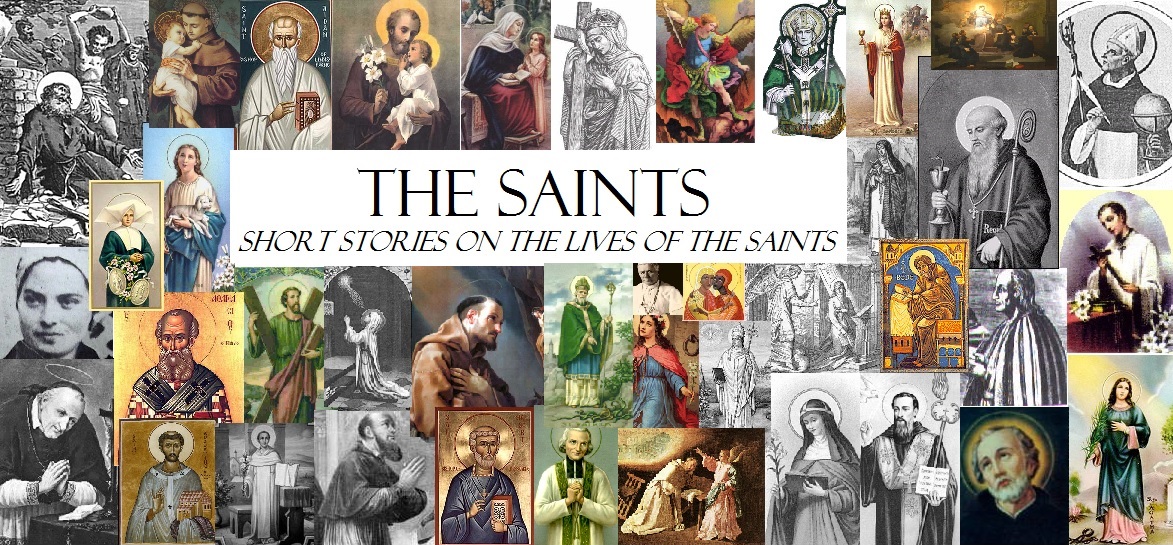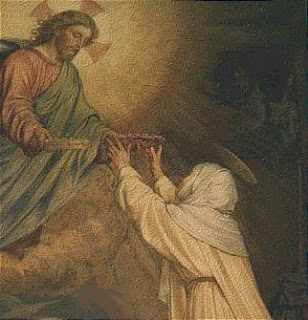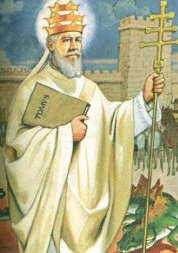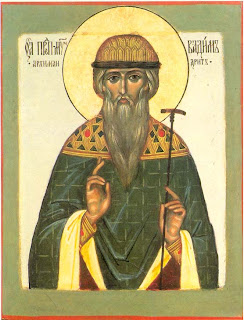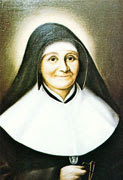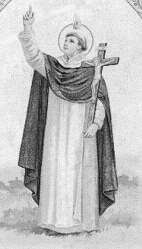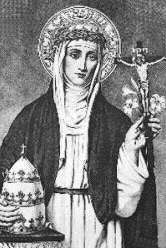
This glorious saint is the Patroness of Italy, her country. She was the youngest child in a family of twenty-five children. Her mother and father wanted her to wear pretty clothes and choose a husband, but Catherine wanted only to become a nun. When she cut off her long, beautiful hair, to make herself unattractive, her family was so angry that they scolded her all day long and made her work like a slave in her own home. At last, however, they let her become a sister.
St. Catherine suffered terrible temptations after, but she always fought the bravely. Once she said to Jesus, “Where were you, Lord, when I had such shameful temptations?” And Jesus answered, “Daughter, I was in your heart and I made you win with my grace.”
Jesus often appeared to St. Catherine and talked with her lovingly. One night, when all people were out on the streets celebrating, He appeared to her praying alone in her room. With Him was His Blessed Mother. She took Catherine’s hand and lifted it up to her Son. Jesus put a ring on the Saint’s finger and so she became His bride.
In St. Catherine’s time, the Church had many troubles, and there were fights going all over Italy. The Saint wrote letters to Kings and Queens and went herself to beg rulers to make their peace with the Pope and to avoid wars.
Catherine never forgot that Jesus was in her heart-no matter how busy she was. And through her, Jesus converted the sick people she lovingly nursed and the prisoners she visited in jail. The Pope himself accepted Catherine’s advice to go back to Rome from France because it was God’s will that he govern the Church from Rome. The Pope listened to St. Catherine and went back, because he knew how close she was to God.
Let us offer our whole heart to God so that like St. Catherine, we will discover how wonderful it is to love the Lord.

Search This Blog
4/30/08
St. Catherine of Siena
St. Catherine of Siena - Patroness of Italy and of Nursing - April 30th
4/29/08
St. Peter of Verona
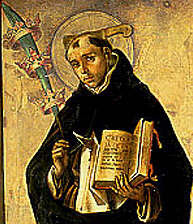
St. Peter of Verona - April 29th
As a young boy, this Italian Saint learned of the Catholic Faith, although his parents were not Catholic. So well did he know his religion that no argument could make him change his mind. And so good a Catholic was he that no bad example led him into sin. He was still young when he entered the Dominican Order. St. Dominic himself gave him the holy habit. Later, as a priest, Peter traveled up and down Italy preaching and converting many people. However, before God gave him the grace of martyrdom, He permitted him to suffer very much. In fact, he was falsely accused of having received women into his cell. His Superiors scolded him very strongly for this, but the humble Saint did not defend himself. He was forbidden to preach any more, and he accepted this penance without a word of complaint. Yet deep in his heart, he suffered greatly. One night when he could not sleep, he fell to his knees in front of the crucifix and sobbed, “Jesus, You know I am pure and innocent. Why do You let me suffer like this?” Back came this answer from the crucifix: “And I, Peter, what did I do to deserve My passion and death?” That gave the Saint courage, and soon afterwards, his innocence was proved.
The enemies of the true Faith, too, made St. Peter suffer. They did all they could to stop him from preaching. Yet he continued without fear. At last he was attacked and murdered. Just before he died, he dipped his finger in his own blood and wrote on the ground: “I believe in God.” His murderer, a man named Carino, soon repented of his crime. He became a Catholic, joined the Dominican Order, and died a holy death.
When we recite the Apostles’ Creed, let us say it with all our heart, and be grateful to God for giving us the same Faith as the Saints had.
Categories:
April - Month of the Holy Ghost,
Dominican,
Martyrs,
Monks/Brothers,
Priests,
Saints-P
4/28/08
St. Peter Chanel
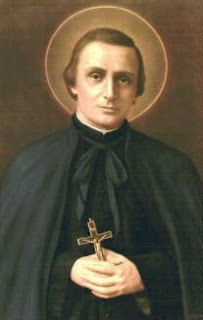
St. Peter Chanel - April 28th
From the time he was seven, this French boy took care of his father’s sheep. Through poor, he was intelligent and loved his Faith, too. One day, a good parish priest met him and thought so much of Peter that he asked his parents if he could educate him. In this priest’s little school and later in the seminary, Peter won the admiration of everyone. While he was a parish priest, he was so kind to the sick of his parish that many people decided to change their bad lives and return to God.
Because he had a great desire to be a missionary, St. Peter became a Marist. He hoped he would be sent to the pagans far away, and after a few years, his wish came true. He and a group of his brother missionaries were sent to the islands of the South Pacific. Father Peter and one brother were assigned to the island of Futuna. There the people willingly listened to Father Peter preach. “This man loves us,” one of the tribesmen said. “And he does what he teaches.”
However, the chief of this tribe became jealous of St. Peter’s success. When his own son was baptized, he was furious and sent a band of his men to kill the missionary. All Father Peter said as he lay dying was, “It is well with me.” Within a short time after his martyrdom, the whole island became Christian.
Jealousy leads people to do many evil things. If we see others doing good, let us thank God for it and try to imitate their good example.
From the time he was seven, this French boy took care of his father’s sheep. Through poor, he was intelligent and loved his Faith, too. One day, a good parish priest met him and thought so much of Peter that he asked his parents if he could educate him. In this priest’s little school and later in the seminary, Peter won the admiration of everyone. While he was a parish priest, he was so kind to the sick of his parish that many people decided to change their bad lives and return to God.
Because he had a great desire to be a missionary, St. Peter became a Marist. He hoped he would be sent to the pagans far away, and after a few years, his wish came true. He and a group of his brother missionaries were sent to the islands of the South Pacific. Father Peter and one brother were assigned to the island of Futuna. There the people willingly listened to Father Peter preach. “This man loves us,” one of the tribesmen said. “And he does what he teaches.”
However, the chief of this tribe became jealous of St. Peter’s success. When his own son was baptized, he was furious and sent a band of his men to kill the missionary. All Father Peter said as he lay dying was, “It is well with me.” Within a short time after his martyrdom, the whole island became Christian.
Jealousy leads people to do many evil things. If we see others doing good, let us thank God for it and try to imitate their good example.
4/27/08
St. Peter Canisius
St. Peter Canisius - Patron of Germany - April 27th
Peter was a Dutchman whose father wanted him to be a lawyer. To please him, young Peter began to study law after he had finished all his other studies. Soon enough, however, he realized that he would never be happy in that life. About that time, people all over were talking about the wonderful preaching of Blessed Peter Faber, who was one of the first members of the Jesuit order. When Peter Canisius listened to him, he knew he, too, would be happy serving God as a Jesuit. So he entered, and after more years of study and prayer, he was ordained a priest.
The great St. Ignatius soon realized what an obedient and zealous apostle St. Peter Canisius was. He sent him to Germany where Peter labored for forty years.
It would be hard to name all St. Peter Canisius’ great works, prayers and sacrifices to save many cities of Germany from heresy and to bring back to the Catholic Church those who had accepted false teachings. It is said that he traveled about twenty thousand miles in thirty years, sometimes on foot and sometimes on horseback.
In spite of all this, St. Peter Canisius still found time to write many books on the Faith. He realized how important books are. So he made a campaign to stop bad books from being sold. And he did all he could to spread good books to teach the Faith. The two catechisms St. Peter Canisius wrote were so popular that they were printed over two hundred times and were translated into fifteen languages.
To those who said he worked too hard, St. Peter Canisius would answer, “If you have too much to do, with God’s help, you will find time to do it all.”
Most of the wrong ideas on our Faith are the result of not knowing enough about it. Let us often take out books from our school or parish library so that we will know our holy Faith well and be able to explain it to others.
Peter was a Dutchman whose father wanted him to be a lawyer. To please him, young Peter began to study law after he had finished all his other studies. Soon enough, however, he realized that he would never be happy in that life. About that time, people all over were talking about the wonderful preaching of Blessed Peter Faber, who was one of the first members of the Jesuit order. When Peter Canisius listened to him, he knew he, too, would be happy serving God as a Jesuit. So he entered, and after more years of study and prayer, he was ordained a priest.
The great St. Ignatius soon realized what an obedient and zealous apostle St. Peter Canisius was. He sent him to Germany where Peter labored for forty years.
It would be hard to name all St. Peter Canisius’ great works, prayers and sacrifices to save many cities of Germany from heresy and to bring back to the Catholic Church those who had accepted false teachings. It is said that he traveled about twenty thousand miles in thirty years, sometimes on foot and sometimes on horseback.
In spite of all this, St. Peter Canisius still found time to write many books on the Faith. He realized how important books are. So he made a campaign to stop bad books from being sold. And he did all he could to spread good books to teach the Faith. The two catechisms St. Peter Canisius wrote were so popular that they were printed over two hundred times and were translated into fifteen languages.
To those who said he worked too hard, St. Peter Canisius would answer, “If you have too much to do, with God’s help, you will find time to do it all.”
Most of the wrong ideas on our Faith are the result of not knowing enough about it. Let us often take out books from our school or parish library so that we will know our holy Faith well and be able to explain it to others.
4/26/08
Our Lady of Good Counsel
Our Lady of Good Counsel
- April 26th
Good Counsel means “good advice.” The beautiful devotion of Our Lady of Good Counsel goes way back to the year 1467. Even before then, Christians had prayed to our Blessed Mother for her help and advice when they were in doubt. But devotion to Our Lady of Good Counsel really spread everywhere when on April 25, 1467, a most beautiful picture of her appeared in the old Church of Santa Maria at Genazzano, Italy. It was a small picture but the wonderful thing about it was that it stayed right in mid-air, without being held up by anything! At once people began to come from all over to visit the Church of Santa Maria.
Many miracles happened and are still happening at this shrine of Mary. Bishops and even Popes have had great devotion to Our Lady of Good Counsel. One Pope had her holy picture crowned with gold. There are also many churches named for Our Lady of Good Counsel.
When we have a problem, who can give us better advice than our own good Mother Mary? Let us always pray to Our Lady of Good Counsel to ask her help.
4/25/08
St. Mark the Evangelist

St. Mark the Evangelist - Patron of Notaries - April 25th
Mark lived in Palestine at the time of Our Lord. He was a relative of St. Barnabas. While still a young man, he went with the great Apostles Paul and Barnabas on a missionary journey to bring the teachings of Christ to new lands. Before it was over, though, he grew discouraged and went back home to Jerusalem. Later, he was much braver, and he became a beloved disciple of St. Peter, the first Pope. With St. Peter, he went to Rome. Here St. Peter preached about Jesus to the Romans. The people asked St. Mark to write down everything St. Peter said, and he did. This book is called the Gospel of St. Mark.
It is a life of Christ told by St. Peter himself and it gives us many little details that are not in the other Gospels.
Mark was consecrated a bishop and sent to Egypt. There he converted many people. After a life of sufferings serenely endured for the glory of God, he went through a long and very painful martyrdom.
His wicked enemies tied his feet with rope and dragged him through the streets for a whole day. The ground was stained with St. Mark’s blood, but he was happy for the chance to suffer for Jesus. That night in prison, Jesus Himself came to comfort and strengthen St. Mark. The next day his enemies dragged him on the ground again until he died of his many wounds.
St. Mark’s relics were later brought to Venice and today they are venerated in the beautiful Basilica of St. Mark.
There is no book in the world more important than the Holy Gospels. The wisest and holiest of men have always loved to read them over and over again. Let us, too, make sure we have a copy of the Holy Gospels and that we read them.
4/24/08
St. Fidelis of Sigmaringen
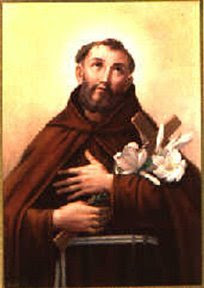
St. Fidelis of Sigmaringen - April 24th
This Saint’s name was Mark Rey. He was born in Germany and went to a famous University of Freiburg to become a lawyer. Even as a young student, he liked to visit the sick and the poor and to spend many hours praying. His brother became a Capuchin priest, but Mark finished his studies and became a famous lawyer.
Many times he would help poor people who had no money to a pay a lawyer. For this reason, he was given the nickname, “The Poor Man’s Lawyer.”
Because he was very honest and polite, Mark became disgusted with the arguments and dishonesty of those law courts. He decided to become a Capuchin priest. He received the holy robe of the monks and took the name, Fidelis, which means “faithful.”
Father Fidelis knew that his life was in danger, yet he went to go to Switzerland to preach. In Switzerland there were many enemies of the Catholic faith, and he wanted to try to win these people back to Jesus. His preaching brought wonderful results, and many people converted. The bitterest enemies grew wild with anger at his success.
St. Fidelis knew that his life was in danger, yet he went right on preaching. In the middle of one sermon, a shot was fired at him, but the bullet missed. He started back over the road on which he had come to town. A group of men with guns stopped him and ordered him to give up the Catholic religion. The Saint answered meekly but firmly, “I will not renounce the Catholic Faith!” At once, the cruel men struck him down.
St. Fidelis pulled himself up and kneeling, prayed: “Lord, forgive my enemies. They do not know what they are doing. Lord Jesus, have mercy on me! Holy Mary, my Mother, help me!” Another blow hit him and then more and more blows until this hero’s life was taken away.
It is a great honor to be able to help others come back to Jesus, back to Church. Let us try, by prayer, good example and kind words, to be real apostles.
Categories:
April - Month of the Holy Ghost,
Lawyers,
Monks/Brothers,
Priests,
Saints-F
4/23/08
St. George
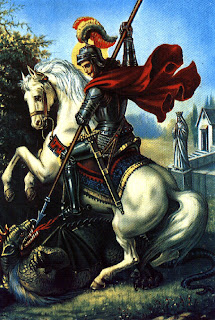
St. George - Patron of England and of Soldiers - April 23rd
Pictures of St. George usually show him killing a dragon to rescue a beautiful lady. The dragon stands for wickedness. The lady stands for God’s holy truth. St. George was a brave martyr who was victorious over the devil.
He was a soldier in the army of the Roman Emperor Diocletian, and he was one of the Emperor’s favorite soldiers. Now Diocletian was a pagan and a bitter enemy of the Christians. He put to death every Christian he could find. George was a brave Christian, a real soldier of Christ. Without fear, he went to the Emperor and sternly scolded him for being so cruel. Then he gave up his position in the Roman army. For this he was tortured in many terrible ways and finally beheaded.
So boldly daring and so cheerful was St. George in declaring his Faith and dying for it that Christians felt courage when they heard about it. Many songs and poems were written about this martyr. Soldiers, especially, have always been devoted to him.
We all have some “dragon” we have to conquer. It might be pride or anger or laziness or greediness or something else. Let us make sure we fight against these “dragons,” with God’s help. Then we can call ourselves real soldiers of Christ.
4/22/08
Sts. Soter and Caius
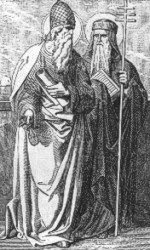
Sts. Soter and Caius - April 22nd
St. Soter was Pope long ago, in the times of the Roman Emperors. He was a real father to all Christians. He gave much help to those who had been condemned to work in dangerous mines because they would not give up their faith. These brave Christians had little to eat and were not allowed to rest hardly at all. Other Christians were chained in prisons. Good Pope Soter did everything he possibly could to comfort and help them.
St. Soter also helped churches that were far away from Rome. This holy Pope was a great preacher. All the Christians loved to listen to him explain our religion, because he spoke so beautifully. He inspired them with new courage to die for Christ rather than sacrifice to false gods. After ten years as Pope, St. Soter himself gave his life for Jesus.
St. Caius was Pope about one hundred years later. He, too, lived in times of persecution and he did all he could to prepare his good people to keep the Faith at any sacrifice. In order to be of more help to his people, he lived eight years in underground rooms, called catacombs. These were cemeteries where the Christians often met in secret to pray and receive the Sacraments. This was their hiding place from the cruel pagan soldiers, who would kill them if they caught them.
St. Caius was Pope for twelve years. Then, he, too, was put to death for the Faith.
Today people in different parts of the world are persecuted because they are good Christians. Let us offer our prayers and sacrifices that they may keep up their courage.
4/21/08
St. Anselm
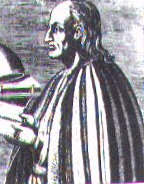
St. Anselm - April 21st
Anselm was born in northern Italy. From his home, you can see the high mountains called the Alps. When Anselm learned from his mother that God is in Heaven, he loved to look up at the very tops of those mountains. Since he was a little boy then, he thought that the mountains were like ladders leading up to the palace of the King of Heaven.
When Anselm was fifteen, he tried to enter a monastery, but his father was against it. Then Anselm became sick and not long after he got better, his mother died. He was still young and rich and clever, and soon he forgot about wanting to serve God. He began to think only of having good times.
Yet, after a while, Anselm became bored with this way of life. He wanted something better, something more important. So he went to visit the holy Abbot Lanfranc of the great monastery of Bec. He became Lanfranc’s very close friend and the and the holy abbot brought him close to God. He also helped Anselm decide to become a monk.
Three years later, Anselm was made the superior. He was a very warm-hearted man who were jealous of him at first became his friends. When he had to leave them to become Archbishop of the great diocese of Canterbury in England, he told them that they would always live in his heart.
The people of England loved and respected Anselm very much. However, the king at this time was the wicked William Rufus. This king persecuted the Saint in every way and even forbade him to go to Rome to ask the Pope’s advice. But Anselm went anyway, and stayed with the Pope until the king died. Then he went back to his diocese in England.
Even in the midst of his many duties, St. Anselm always found time to write important books of philosophy and theology. To please his monks, he also wrong down the many wonderful instructions he had given them about God. He used to say: “Would you like to know the secret of being happy in the monastery is a real Heaven on earth for those who live only for Jesus.”
Let us realize that just having a lot of fun will not make us happy. True happiness can only be found in loving God and helping our neighbor.
4/20/08
St. Agnes of Montepulciano
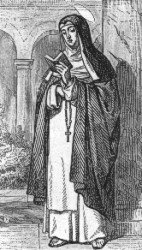
St. Agnes of Montepulciano - April 20th
This young saint was born of wealthy parents near the city of Montepulciano in Italy.
When she was just nine years old, she begged her mother and father to let her enter a convent. Agnes was very happy living with the sisters, and before too long she was so good a nun that the other sisters were very pleased to have her. She was of good example to all, especially because of the wonderful way she prayed.
When she was only fifteen, Agnes was chosen superior of a whole convent of nuns! The Pope had to give a special permission to let such a young girl be the head of a convent.
Agnes was a very good superior because she was much wiser than most teenagers are. Besides that, she did great penance and was always very sweet and charitable. She truly loved God and her neighbor. God was especially pleased with Agnes and gave her many graces in answer to her prayers. Once He even let her hold the Christ Child in her arms!
Agnes was a sickly women, but she bore her sickness for years with heroic patience. She never complained of felt sorry for herself. Instead, she offered everything to God.
Towards the end of her life, when her sisters saw that she was not going to get better, they were very sad. “If to love me, you would be glad,” said Agnes, “because I am going to enter the glory of Jesus.” She died while she was praying very fervently.
We must always trust that our Heavenly Father will hear our prayers and give us whatever is for our best.
4/19/08
St. Alphege
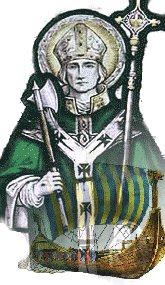
St. Alphege - April 19th
Alphege is an English saint. He became a monk and after a few years was made abbot of the monastery. When he was thirty years old, he became Bishop of Winchester. He had not wanted this honor, but he accepted it because it was God’s will. And he did much good. He was so kind to the poor that there were no beggars left in his whole diocese. Next he was made archbishop of Canterbury, the most important Church in England.
The year after he came to the city, a group of fierce raiders, called the Danes, attacked. They burned the buildings and killed many people, even women and children. St. Alphege tried to make them stop, but the cruel raiders took him prisoner and carried him off. They told the people of Canterbury that they would have to pay a large amount of money if they wanted to have their Archbishop back.
St. Alphege would not let his poor Christian people pay that much money for him. He said, “It is better to give what we have to the poor than to take from them the little they have.”
When the Saint had been in prison seven months, the men who had captured him became drunk on night. Angry because they had not gotten the money they wanted, they took the holy Archbishop and beat him. Then they stoned him. At last, on killed him with an axe.
Like Our Lord, St. Alphege prayed for his murderers just before he died.
Even in prison St. Alphege did not want people to think of him or sacrifice for him. Let us remember that what we suffer silently for God gains a great reward in Heaven for us.
4/18/08
Blessed Mary of the Incarnation
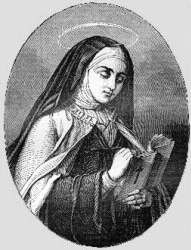
Blessed Mary of the Incarnation - April 18th
Beautiful Barbara Acarie was a French girl who was married when she was seventeen. God sent her six children, and her home was a happy one. She was a very good wife and mother. All her children, her husband, and her servants, too, learned from her a great love for prayer and works of charity.
Once, when her husband was accused of a crime, Barbara herself saved him. She went to court, and all alone proved that he was not guilty.
Although she was so busy with her own family, she always found time to feed starving people, to teach heretics about the faith, to help the sick and dying, and to encourage sinners to change their ways.
When her husband died, Barbara entered the Carmelite Order. Her three daughters were Carmelites, too. Barbara’s new name as a sister was Sister Mary of the Incarnation. She joyfully worked in the kitchen among the pots and pans. When her own daughter became a superior, Blessed Mary willingly obeyed her. So humble was she that as she was dying, she said: “The Lord forgive me the bad example I have given.” But the truth was that she had only done good all her life.
God gives everyone the grace to become a saint in his state in life. Let us, then, pray so that we will do in life what god wants us to do.
4/17/08
St. Stephen Harding
St. Stephen Harding - April 17th
Stephen was a rich young Englishman who always looked cheerful and calm. He was a good student and learned about literature but especially about how to pray well. Once Stephen and a friend set out for Rome as pious pilgrims. They walked along in silence, thinking about God and praying to themselves. They only spoke when they prayed together.
When they returned, Stephen joined a very poor and holy community of monks. Their abbot was another saint, St. Robert. For a while he served God joyfully, but then the monks in that monastery did not want to live such a hard life any more. So St. Robert and St. Stephen, with twenty other fervent monks, went to start a new monastery in a wilderness in France called Citeaux. Here they lived a life of work and great poverty-to imitate the poverty of Jesus. They kept silence very strictly and were very devout and humble.
When St. Stephen became Superior, he had many troubles. There was so little food that he was forced to go out and beg from door to door. Then over half of the monks fell sick and died. It looked as though the community would come to an end, but St. Stephen prayed with faith. And his prayer was rewarded. God sent to this Cisterian monastery the great St. Bernard with thirty other gentlemen.
When he lay dying, St. Stephen heard those around him whispering that he had nothing to fear. Had he not led a virtuous life of hard labor and love of God? But St. Stephen told them that he was afraid he had not been good enough. That shows us how humble this great saint was.
We cannot get to Heaven only by praying. We have to work, too. That means we have to do every one of our duties without being lazy.
Stephen was a rich young Englishman who always looked cheerful and calm. He was a good student and learned about literature but especially about how to pray well. Once Stephen and a friend set out for Rome as pious pilgrims. They walked along in silence, thinking about God and praying to themselves. They only spoke when they prayed together.
When they returned, Stephen joined a very poor and holy community of monks. Their abbot was another saint, St. Robert. For a while he served God joyfully, but then the monks in that monastery did not want to live such a hard life any more. So St. Robert and St. Stephen, with twenty other fervent monks, went to start a new monastery in a wilderness in France called Citeaux. Here they lived a life of work and great poverty-to imitate the poverty of Jesus. They kept silence very strictly and were very devout and humble.
When St. Stephen became Superior, he had many troubles. There was so little food that he was forced to go out and beg from door to door. Then over half of the monks fell sick and died. It looked as though the community would come to an end, but St. Stephen prayed with faith. And his prayer was rewarded. God sent to this Cisterian monastery the great St. Bernard with thirty other gentlemen.
When he lay dying, St. Stephen heard those around him whispering that he had nothing to fear. Had he not led a virtuous life of hard labor and love of God? But St. Stephen told them that he was afraid he had not been good enough. That shows us how humble this great saint was.
We cannot get to Heaven only by praying. We have to work, too. That means we have to do every one of our duties without being lazy.
4/16/08
St. Benedict Joseph Labre
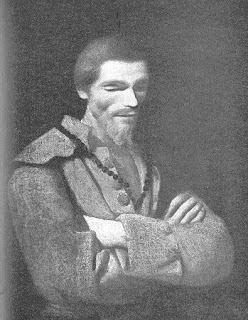
St. Benedict Joseph Labre - April 16th
This French saint led a most unusual life. He was the son of a store owner and taught by his uncle, a priest. When the good priest died, Benedict tried to enter a monastery, but he was told he was too young. Then he entered another, but his superiors had to dismiss him because he had become like a shadow on account of his poor health. “God’s will be done,” said Benedict.
While he was gaining back his health, he felt inspired to leave his relatives and his country to live a life of penance in the midst of the world. As a pilgrim, he would travel to the famous shrines of Europe.
Benedict went visiting one church after another. He dressed in rags, with a crucifix over his heart and a rosary around his neck. He slept on the bare ground. They only food he had was what kind people gave him. If people gave him money, he gave it to the poor. In a sack he carried his own Gospel, and medals and holy books to give to others. St. Benedict paid no attention to the beautiful sights in the cities he visited. His only interest was in the churches where Jesus dwells in the Blessed Sacrament.
While he prayed in front of the alter, Benedict was so still and devout that he seemed like an angel adoring God. Hid white, tired face would glow with happiness. He had a great love for our Blessed Mother, too. “Mary, O my Mother!” he would exclaim.
St. Benedict was not interested in taking care of himself. His only thought was to keep Jesus company in church.
When he died at the age of thirty-five, the fame of this poor holy man spread far and wide.
We cannot imitate the poverty of Jesus in the way St. Benedict Joseph did, but we can imitate this Saint’s love for the Blessed Sacrament. Let us go to church often to visit Jesus and to have a heart-to heart talk with Him. Jesus is our best Friend.
4/15/08
St. Lydwina
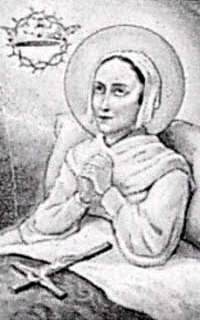
St. Lydwina - Patroness of Skaters - April 15th
Lydwina means “suffering” and this Saint from Holland spent her whole life suffering for Jesus. As a young teenager of fifteen, she dedicated herself completely to God. Since she was very pretty, she was afraid many young men would want to marry her. So Lydwina asked Jesus to take away her beauty, and He answered her prayer.
One day she went skating with her friends and one of them bumped into her by accident. Lydwina fell hard onto the ice, and that was the beginning of her life of suffering. The pain in her side hurt her so much that she could not stand or sit or lay down. She would ask to be moved from one bed to another, but the pain only grew worse. Crying, Lydwina finally threw herself on her father’s knee, saying she could not stand the pain anymore. But more and more pains came-sores on her face, on her body, blindness in one eye, and at last, she could not even leave her bed at all.
For thirty-eight years, Lydwina suffered. At first she felt very bad, but when a priest told her to think of what Jesus suffered, Lydwina took courage. God comforted her so much that she was brave enough to add more penance herself!
Lydwina was good to everyone who came to her poor little room. It became like a little heaven of happiness. She had a way of winning even hardhearted people and of stopping folks from quarreling.
Lydwina’s special love was for Jesus in the Holy Eucharist. For many years, she seemed to live only on Holy Communion.
A strong soldier of Christ can hold back tears and offer his pain to God.
4/14/08
St. Justin

St. Justin - Patron of Philosophers - April 14th
St. Justin was born in Palestine. His father brought him up as a pagan. When he was a boy, he read poetry, history, and science. As he grew up, he kept on studying, but for one purpose only. He was looking for the truth about God.
One day as he was walking along the shore of the sea, Justin met an old man. They began to talk together and since he looked troubled, the old man asked him what kind of doubts he had. Justin answered that he was unhappy because he had not found anything certain about God in all the books he had read. The old man told him about Our Lord Jesus Christ and encouraged him to pray so that he would be able to understand the truth about God.
St. Justin began to pray and to read the word of God in the Bible, which he grew to love very much. He was also impressed on seeing how bravely the martyrs were dying for the Christian faith.
After learning more about the Christian religion, Justin became a Christian himself. Then he used his great knowledge to explain and defend the Faith with many writings.
It was in Rome that St. Justin was arrested for being a Christian. The judge asked him, “Do you think that by dying you will enter Heaven and be rewarded?” “I don’t just think, “ the Saint answered. “I am sure!” And he died a martyr.
To keep our faith strong, let us make an Act of Faith often. A very short Act of Faith we might repeat from time to time is: “My God, I believe in You.”
4/13/08
Blessed Margaret of Castello
Blessed Margaret of Castello - Patroness of the Right-To-Life Groups - April 13th
Blessed Margaret (1287-1320) was born a hunchback, midget, blind, lame and ugly. When she was six years old, her proud and noble parents walled her up beside a chapel. She could not get out, but could attend Mass and receive the Sacraments. After 14 years of imprisonment, her parents took her to a shrine to pray for a cure. When no cure took place they abandoned her. She eventually became a lay Dominican and spent the rest of her life in prayer and works of mercy. Her charity towards others was unbounded. When she died at age 33, the townspeople thronged to her funeral and demanded that "the saint" be buried in a tomb inside the church. The priest protested, but when a crippled girl was miraculously cured at the funeral, the people had their way. Blessed Margaret is the patron of the Right-To-Life groups.
Categories:
April - Month of the Holy Ghost,
Dominican,
Nuns/Sisters,
Saints-M,
Virgins
4/12/08
St. Sabas the Goth
St. Sabas the Goth - April 12th
A tribe of barbarians called Goths had come down into Europe and conquered many lands. Some of the Goths became Christians, and one of these was St. Sabas.
From the time he joined the Church as a young boy, he grew in goodness and humility.
The King of the Goths began a terrible persecution of all the Christians among his subjects. Although Sabas made no secret of his Christian faith, he was not taken prisoner during the first year of the persecution. The next year, the King’s men came to St. Sabas’ town looking for Christians. Some of the people of the town decided to swear that there were no Christians there. But St. Sabas would not stand for that. Without fear he stepped up to the officers and said, “Let no man swear for me. I am a Christian.”
The persecutors asked the people how rich St. Sabas was. When they found out that he was just a poor, simple fellow, they did not think it worthwhile to bother with him, so they let him go.
The third year, the persecution of the Christians was worse than ever. This time St. Sabas was thrown into a river and held down with a pole until he died.
Just before he was put to death, St. Sabas joyfully said to the soldiers, “I see what you cannot see. There are people on the other side of the river ready to receive me into the glory of Heaven.”
When we find it hard to do our duty, let us think of the reward God will give us.
A tribe of barbarians called Goths had come down into Europe and conquered many lands. Some of the Goths became Christians, and one of these was St. Sabas.
From the time he joined the Church as a young boy, he grew in goodness and humility.
The King of the Goths began a terrible persecution of all the Christians among his subjects. Although Sabas made no secret of his Christian faith, he was not taken prisoner during the first year of the persecution. The next year, the King’s men came to St. Sabas’ town looking for Christians. Some of the people of the town decided to swear that there were no Christians there. But St. Sabas would not stand for that. Without fear he stepped up to the officers and said, “Let no man swear for me. I am a Christian.”
The persecutors asked the people how rich St. Sabas was. When they found out that he was just a poor, simple fellow, they did not think it worthwhile to bother with him, so they let him go.
The third year, the persecution of the Christians was worse than ever. This time St. Sabas was thrown into a river and held down with a pole until he died.
Just before he was put to death, St. Sabas joyfully said to the soldiers, “I see what you cannot see. There are people on the other side of the river ready to receive me into the glory of Heaven.”
When we find it hard to do our duty, let us think of the reward God will give us.
4/11/08
St. Leo the Great
St. Leo the Great - April 11th
St. Leo was Roman, At the death of Pope Sixtus, he became Pope.
Those were hard times for the Church because there were barbarian armies attacking Christians in many places and there were many people spreading errors about the Faith. But St. Leo was one of the greatest Popes there ever was. He was absolutely unafraid of anything of anyone. He had great trust in the help of the first Pope, St. Peter the Apostle.
To stop the spread of the false teachings, St. Leo explained the true Faith with his famous writings. He called a council to condemn the wrong doctrines. Those who would not give up their heresy were put out of the Church. Those who were sorry, the Saint received back into the Church and asked people to pray with him for them.
When a great army of barbarians called Huns came to attack the city of Rome, all the people were filled with fear. They knew that the Huns had already burned many cities. To save Rome, St. Leo rode out to meet the terrible enemy leader, Attila. The only weapon he had was his great trust in God! When they met, something wonderful happened. Attila, the cruel pagan leader, showed the Pope great honor, and made a treaty of peace with him. Attila said afterwards that he had seen two mighty figures standing by the Pope while he spoke! These were the great Apostles Peter and Paul, sent by God to protect Pope Leo and the Christians.
Because of his humility and charity, Pope Leo was loved by all. He was Pope for twenty-one years.
We will pray more often for our Holy Father and the Church all over the world.
4/10/08
St. Bademus
St. Bademus - April 10th
Bademus was very wealthy man of Persia who felt the desire to give himself to God. He found a monastery near his own city and ruled it with great holiness. He spent while nights in prayer and sometimes, for several days, the only thing he ate was bread and water. He showed his followers how to become saints by being kind, understanding, and loving. In doing these things, Bademus found true happiness.
For thirty-six years, the King had been persecuting the Christians. Now, some of his men arrested the Abbot Bademus and seven of his followers. They were locked up in chains and put in prison for four months. Every day they were taken out and were beaten with ropes and whip-like sticks. With patience and joy they suffered it all for Jesus.
At the same time, a Christian prince named Nersan was also put in prison for the Faith. At first he refused to adore the sun, but then he lost courage and gave up the Faith. The cruel king told Nersan that if he would kill St. Bademus, he would be set free and given back all his property. Narsan picked up the sword to murder Bademus who stood there unafraid to die for Christ. Suddenly Nersan stopped, frightened at the terrible at the terrible sin he was about to commit. ‘Unhappy Nersan,” said St. Bademus. “I am ready to die, but I wish you were not the one to put me to death!”
Yet Nersan was too much of a coward to stand up and die for his faith. At last he began to strike the Abbot. His hand shook so much that he kept wounding the Saint without killing him. St. Bademus took the terrible pain patiently. At last Nersan killed him. For his crime, he himself was tortured and killed by the sword.
Let us resolve never to be cowards who sin out of fear.
4/9/08
St. Waldetrudis
St. Waldetrudis - April 9th
Waldetrudis was born in Belgium. Her mother, her father and sister are all saint. She grew up to be a beautiful girl whose sweet ways, even when she was enjoying herself, filled everyone with good thoughts. Many great noblemen wanted to marry Waldetrudis. The one her holy parents chose for her was the Count Meldegario. They could not have picked a better man, because he, too, became a saint!
The holy couple had four boys. And all four of them also became saints. That makes nine saints in one family. Of course, Waldetrudis was very happy that God had given her such a good family. yet she had to suffer very much in her lifetime.
Jealous ladies spread terrible stories about her. They were not pure and kind as she was, and they did not want people to think she was better than they. So they said she only prayed and did good deeds to hide her secret sins. Of course it was all a lie, but the Saint did not defend herself. She thought of how Jesus suffered on the Cross and like Him, she forgave her enemies. This suffering made her realize how much better it would be to give herself entirely to God as a nun. her good husband had already gone to be a monk.
Waldetrudis became a holy, pious nun who did much penance and works of charity. For a while she had a great temptation to go back to her home in the world. She felt lonely and sad. But she kept praying and she refused to let the devil's temptation scare her. At last, the temptation left her, and her heart was full of joy again.
Only those who fight hard battles will succeed. If we want to be saints, we must pray and bravely battle against all temptation and difficulties.
Waldetrudis was born in Belgium. Her mother, her father and sister are all saint. She grew up to be a beautiful girl whose sweet ways, even when she was enjoying herself, filled everyone with good thoughts. Many great noblemen wanted to marry Waldetrudis. The one her holy parents chose for her was the Count Meldegario. They could not have picked a better man, because he, too, became a saint!
The holy couple had four boys. And all four of them also became saints. That makes nine saints in one family. Of course, Waldetrudis was very happy that God had given her such a good family. yet she had to suffer very much in her lifetime.
Jealous ladies spread terrible stories about her. They were not pure and kind as she was, and they did not want people to think she was better than they. So they said she only prayed and did good deeds to hide her secret sins. Of course it was all a lie, but the Saint did not defend herself. She thought of how Jesus suffered on the Cross and like Him, she forgave her enemies. This suffering made her realize how much better it would be to give herself entirely to God as a nun. her good husband had already gone to be a monk.
Waldetrudis became a holy, pious nun who did much penance and works of charity. For a while she had a great temptation to go back to her home in the world. She felt lonely and sad. But she kept praying and she refused to let the devil's temptation scare her. At last, the temptation left her, and her heart was full of joy again.
Only those who fight hard battles will succeed. If we want to be saints, we must pray and bravely battle against all temptation and difficulties.
4/8/08
St. Julie Billiart
St. Julie Billiart - April 8th
Mary Rose Julie Billiart was a strong, young girl of Belgium. In fact, when she was just seven, she used to explain it to other children less intelligent than she. When her parents became poor, she worked very hard to help support the family. She even went to help support the family. She even went to help with the harvesting in the fields. Yet she always found time to visit the sick, to pray, and to teach the catechism.
However, while she was still a young women, she became very ill and completely paralyzed. Although helpless, St. Julie offered her prayers for the saving of many souls. She was more united to God than ever and she kept on teaching catechism from her sickbed. She gave spiritual advice to everyone who visited her and encouraged all to receive Holy Communion often. Many young girls were inspired by her love for God. So they spent their time and money for good works. With Julie as their leader, they founded the Sisters of Notre Dame de Namur.
Once when a priest gave a mission in the town where Julie was, he asked her to make a novena with him for an intention which he would not tell her. After five days, on the feast of the Sacred Heart, the priest said to her: “Mother, if you have faith, take one step in honor of the Sacred Heart of Jesus.” Mother Billiart, who had been paralyzed for twenty-two years, stood up and was cured!
St. Julie spent the rest of her life training young girls to become sisters and watching over her Congregation. She had to suffer much from those who did not understand her mission, but she always trusted in God. Her favorite words were: “How good is the good God!” He assured her that someday her Congregation of Sisters of Notre Dame de Namur would be very large. And that this is just what happened. Today there are a great many of St. Julie’s Sisters teaching young girls all over the world.
When something is worrying us, such as a test in school or troubles at home, let us often say: “Sacred Heart of Jesus, I trust in Thee!”
4/7/08
Blessed Herman Joseph
Blessed Herman Joseph - April 7th
Herman’s parents were very poor people who lived in Germany. Because he was so poor, little Herman did not receive much of an education. Yet his great love for our Blessed Mother kept him out of trouble. He grew up under Our Lady’s loving care and he went to her every time he needed something. He liked nothing better than to spend time praying to Mary.
When he entered a monastery, Herman was not too happy at first. This was because he had to work in the kitchen and serve his brothers at table. So much of his time was spent with the pots and pans that poor Herman could not pray to his Blessed Mother for hours any more. One day he complained about it to her and Our Lady came to tell him not to worry. “For every day work,” she said, “you earn a greater reward in Heaven than if you had prayed all day long!” Then Herman was happy. He knew that we please Our Lord and His Mother most when we do our duty in obedience.
Herman received his other name of Joseph in an unusual way. It was given him by the other monks when they saw how much he was like the great St. Joseph, Our Lady’s Spouse. Herman was so humble that he did not think he deserved that name. So our Blessed Mother herself came to tell him to keep this name-Herman Joseph.
After he became a priest, the holy monk celebrated Mass with such love of God that people cried to see him. Even though he was so spiritual, Herman worked, too. In fact, he was a good Mechanic, and went to on monastery of his Order after another to repair clocks. Herman suffered much from sickness and temptations, but he offered it all to Our Lord and never lost his courage.
Our good actions are like letters that need the right address. This means that they will reach God and bring us a reward only if we do them for Him.
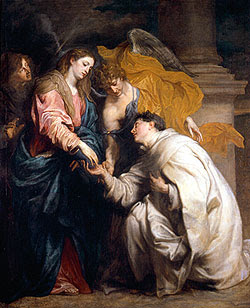
Herman’s parents were very poor people who lived in Germany. Because he was so poor, little Herman did not receive much of an education. Yet his great love for our Blessed Mother kept him out of trouble. He grew up under Our Lady’s loving care and he went to her every time he needed something. He liked nothing better than to spend time praying to Mary.
When he entered a monastery, Herman was not too happy at first. This was because he had to work in the kitchen and serve his brothers at table. So much of his time was spent with the pots and pans that poor Herman could not pray to his Blessed Mother for hours any more. One day he complained about it to her and Our Lady came to tell him not to worry. “For every day work,” she said, “you earn a greater reward in Heaven than if you had prayed all day long!” Then Herman was happy. He knew that we please Our Lord and His Mother most when we do our duty in obedience.
Herman received his other name of Joseph in an unusual way. It was given him by the other monks when they saw how much he was like the great St. Joseph, Our Lady’s Spouse. Herman was so humble that he did not think he deserved that name. So our Blessed Mother herself came to tell him to keep this name-Herman Joseph.
After he became a priest, the holy monk celebrated Mass with such love of God that people cried to see him. Even though he was so spiritual, Herman worked, too. In fact, he was a good Mechanic, and went to on monastery of his Order after another to repair clocks. Herman suffered much from sickness and temptations, but he offered it all to Our Lord and never lost his courage.
Our good actions are like letters that need the right address. This means that they will reach God and bring us a reward only if we do them for Him.

4/6/08
St. William the Abbot
St. William the Abbot - April 6th
William was a young boy of Paris who was taught by his good uncle, the Abbot Hugo. When it was time for him to decide what he should become, William prayed to God to help him make the right choice. Then, on his uncle’s advice, he made up his mind to become a priest.
Although William wanted only to do good to everyone, there were some who became his enemies. They were living bad lives, and every time they saw how kind and pure and devout William was, it made them realize how sinful they were. Instead of changing and copying his good example, they tried to get rid of him. They even told the bishop lies so that he would not make William a priest. But the bishop knew what a holy man William really was and he paid no attention to the false accusations. Next his enemies tried to have the Saint sent away, but again God did not let their plan work out. In the end, it was these evil men who were sent away-and by the Pope himself!
St. William and three companions were asked to go to Denmark to convert sinners and pagans and make the Religious there more fervent. The Saint and his companions got a good start, but then everything began to go wrong. They could hardly stand the bitter cold weather and they were very, very poor. Besides that, they did not understand the language, and they had many enemies. Frightened, St. William’s three friends gave up and went home to France. But the Saint remained. To show how pleased He was with St. William’s trust in Him, Our Lord rewarded him with the conversion of all he had come to help. Then for thirty years the holy Abbot lived in peace and fervor with a great many good monks who imitated his virtues and love of god.
When things get hard, let us not be quitters. God always helps those who turn to Him for help.
William was a young boy of Paris who was taught by his good uncle, the Abbot Hugo. When it was time for him to decide what he should become, William prayed to God to help him make the right choice. Then, on his uncle’s advice, he made up his mind to become a priest.
Although William wanted only to do good to everyone, there were some who became his enemies. They were living bad lives, and every time they saw how kind and pure and devout William was, it made them realize how sinful they were. Instead of changing and copying his good example, they tried to get rid of him. They even told the bishop lies so that he would not make William a priest. But the bishop knew what a holy man William really was and he paid no attention to the false accusations. Next his enemies tried to have the Saint sent away, but again God did not let their plan work out. In the end, it was these evil men who were sent away-and by the Pope himself!
St. William and three companions were asked to go to Denmark to convert sinners and pagans and make the Religious there more fervent. The Saint and his companions got a good start, but then everything began to go wrong. They could hardly stand the bitter cold weather and they were very, very poor. Besides that, they did not understand the language, and they had many enemies. Frightened, St. William’s three friends gave up and went home to France. But the Saint remained. To show how pleased He was with St. William’s trust in Him, Our Lord rewarded him with the conversion of all he had come to help. Then for thirty years the holy Abbot lived in peace and fervor with a great many good monks who imitated his virtues and love of god.
When things get hard, let us not be quitters. God always helps those who turn to Him for help.
4/5/08
St. Vincent Ferrer
St. Vincent Ferrer - Patron of Builders - April 5th
A most wonderful Christian hero of Spain was St. Vincent Ferrer. He had a special devotion to the Blessed Mother. Whenever anyone spoke of her, it made him very happy.
When he was eighteen, Vincent entered the Order of St. Dominic. He was a very intelligent man, but because he was also very humble, he never boasted about his intelligence. He was not interested in learning a lot of useless things. After he finished his studies, he read nothing for three years but the Holy Bible, and he knew it by heart.
First Vincent taught at different colleges. Then he became a great preacher. For twenty years he preached all through Spain and France. Many people were converted by listening to him. Among them were Moslems, pagans and heretics. Although there were no microphones in those days, his voice could be heard from great distance. Everywhere he went, orphanages and hospitals were established, but Vincent remained as humble as ever.
St. Vincent counted on God to make his preaching successful. That is why he prayed before every sermon. But one time, when he knew that a very important person was going to listen to him, he worked harder than usual on his sermon and did not pray. This sermon which he had prepared so carefully did not affect the nobleman much at all. God let that happen to teach Vincent not to count on himself. Another time, this same important person came to listen to the Saint preach, but the Saint did not know it. He prayed and counted on God, as usual. This time the nobleman was greatly impressed by what he heard. When Vincent was told, he said: “In the first sermon it was Vincent who preached. In the second sermon, it was Jesus Christ.”
Let us never brag about our good marks or any other success that comes our way. God will keep helping us all our lives if we pray to Him and not count only on ourselves.
4/4/08
St. Benedict the Moor
St. Benedict the Moor - Patron of Missions - April 4th
St. Benedict’s forefathers were brought in chains from Africa to Sicily. His parents were Negro slaves on a farm. Benedict spent his youth working on this farm.
When he was eighteen, Benedict was given his freedom. He always helped the poor with whatever money he had. This led the people to call him “il Santo Moro”-the Holy Negro.
But there were also jealous people who made fun of Benedict. They insulted him because his parents had been slaves. One day, a holy man was passing by and heard these men insulting Benedict. Turning to them, he said: “You make fun of this poor black man, but before long he will be famous.”
Soon Benedict joined a group of hermits and was so virtuous that they chose him as their leader. When the Pope advised all hermits to join monasteries, Benedict became a Franciscan brother. He was made the cook in his monastery, but he also went out to visit the sick people and prisoners. He comforted everyone in trouble and worked many miracles for the people of the surrounding villages.
When he was elected Superior, he guided the Community for three years with great wisdom, even though he could not read or write. They wanted to reelect him, but Benedict was so humble that he said he was not fir to remain in such a high office.
His brothers had to give in to his humble request, so they made him Assistant Superior. He was asked to teach all the young men who joined the community how to become good Franciscans. Even though he could not read, Benedict could explain the Bible and the catechism in a wonderful way, because of his great love for God.
After several years, Benedict asked if he might become cook again. When he was given permission, he went peacefully and happily back to his kitchen. There he spent the rest of his life, serving others with works of charity and prayer.
Let us remind ourselves that if so many become saints, we can become saints, too. It is up to us! To become saints, we do not need to have special qualities. So let us start now.
St. Benedict’s forefathers were brought in chains from Africa to Sicily. His parents were Negro slaves on a farm. Benedict spent his youth working on this farm.
When he was eighteen, Benedict was given his freedom. He always helped the poor with whatever money he had. This led the people to call him “il Santo Moro”-the Holy Negro.
But there were also jealous people who made fun of Benedict. They insulted him because his parents had been slaves. One day, a holy man was passing by and heard these men insulting Benedict. Turning to them, he said: “You make fun of this poor black man, but before long he will be famous.”
Soon Benedict joined a group of hermits and was so virtuous that they chose him as their leader. When the Pope advised all hermits to join monasteries, Benedict became a Franciscan brother. He was made the cook in his monastery, but he also went out to visit the sick people and prisoners. He comforted everyone in trouble and worked many miracles for the people of the surrounding villages.
When he was elected Superior, he guided the Community for three years with great wisdom, even though he could not read or write. They wanted to reelect him, but Benedict was so humble that he said he was not fir to remain in such a high office.
His brothers had to give in to his humble request, so they made him Assistant Superior. He was asked to teach all the young men who joined the community how to become good Franciscans. Even though he could not read, Benedict could explain the Bible and the catechism in a wonderful way, because of his great love for God.
After several years, Benedict asked if he might become cook again. When he was given permission, he went peacefully and happily back to his kitchen. There he spent the rest of his life, serving others with works of charity and prayer.
Let us remind ourselves that if so many become saints, we can become saints, too. It is up to us! To become saints, we do not need to have special qualities. So let us start now.
Categories:
Angels,
April - Month of the Holy Ghost,
Franciscans,
Monks/Brothers,
Saints-B,
Slaves
4/3/08
St. Richard of Chichester
St. Richard of Chichester - April 3rd
St. Richard was born in England. He and his brother were left orphans when Richard was very young. His brother owned some farms and Richard gave up his studies to help him save them from going to ruin. He did so well that his grateful brother wanted to give the farms to him, but Richard did not accept them. He also refused to marry, because he wanted to study. He went to Oxford University, and when he was thirty-eight, he was appointed chancellor of that University. Later, St. Edmund, who was Archbishop of Canterbury, made him Chancellor of his diocese. When St. Edmund died, St. Richard went to the monastery of the Dominican Friars in France and was ordained a priest.
He was consecrated Bishop of Chichester, England, and that is why he is called Richard of Chichester. The King at this time was not very good. Because he wanted someone else to be bishop of Chichester, he made St. Richard suffer much. Yet the good Saint always helped those who offended him. He must have often remembered the words of Jesus: “Love your enemy.”
As bishop, St. Richard did his duties well. He was always charitable and kind to sinners who were sorry. However, when he had to be stern, he was. He was not afraid of what might happen to him.
When St. Richard became ill, he foretold his death, because God had let him know the exact place and time when he would die. Many miracles took place at the Saint’s grave.
As a farmer, as a chancellor, as a priest and bishop, St. Richard did everything well. We shall try our very best to do our work at home and at school as well as we can, for the love of Jesus.
St. Richard was born in England. He and his brother were left orphans when Richard was very young. His brother owned some farms and Richard gave up his studies to help him save them from going to ruin. He did so well that his grateful brother wanted to give the farms to him, but Richard did not accept them. He also refused to marry, because he wanted to study. He went to Oxford University, and when he was thirty-eight, he was appointed chancellor of that University. Later, St. Edmund, who was Archbishop of Canterbury, made him Chancellor of his diocese. When St. Edmund died, St. Richard went to the monastery of the Dominican Friars in France and was ordained a priest.
He was consecrated Bishop of Chichester, England, and that is why he is called Richard of Chichester. The King at this time was not very good. Because he wanted someone else to be bishop of Chichester, he made St. Richard suffer much. Yet the good Saint always helped those who offended him. He must have often remembered the words of Jesus: “Love your enemy.”
As bishop, St. Richard did his duties well. He was always charitable and kind to sinners who were sorry. However, when he had to be stern, he was. He was not afraid of what might happen to him.
When St. Richard became ill, he foretold his death, because God had let him know the exact place and time when he would die. Many miracles took place at the Saint’s grave.
As a farmer, as a chancellor, as a priest and bishop, St. Richard did everything well. We shall try our very best to do our work at home and at school as well as we can, for the love of Jesus.
4/2/08
St. Francis of Paola
St. Francis of Paola - Patron of Seamen - April 2nd
St. Francis was born in the tiny village of Paola in Italy. His parents were poor but very humble and holy. They had prayed to St. Francis of Assisi for a son, and when he was born, they named him Francis in honor of the great Saint of Assisi. The boy went to a school taught by the Franciscan priests and there he grew in knowledge and virtue.
When he was fifteen, with his parents' permission, he went off to live in a cave, because he wanted to serve God alone. When he was twenty, other young men joined him. Out of charity, St. Francis left his cave and built a church and a monastery for them. He called this new order of religious the "Minims." "Minims" means "the least of all."
Everyone loved St. Francis. He prayed for them all and worked miracles. He always told his followers that they must be kind and humble, and do much penance. He himself was the best example of humility and charity. Once someone visited the Saint and insulted him to his face. When he was finished, Francis quietly picked up some hot coals from the fireplace and closed his hands tightly around them without being burned at all! "Come, warm yourself," he said it his accuser kindly. "You are shivering because you need a little charity." At such a miracle, the visitor changed his mind about Francis. From then on, he admired his greatly.
The King of France, who had not lived a very good life, called for St. Francis when he was dying. Just the thought of dying made him shake with fear! He wanted Francis to work a miracle to cure him, but the Saint told him he had come to prepare him to die a holy death. The King had a change of heart and accepted God's will. He died in the arms of the Saint, after preparing his soul well.
St. Francis died at the age of ninety-one. He spent the last three months of his life alone preparing to appear before Jesus, since he knew when he was going to die.
God loves and blesses those who are humble. Let us not show off or look for praise.
St. Francis was born in the tiny village of Paola in Italy. His parents were poor but very humble and holy. They had prayed to St. Francis of Assisi for a son, and when he was born, they named him Francis in honor of the great Saint of Assisi. The boy went to a school taught by the Franciscan priests and there he grew in knowledge and virtue.
When he was fifteen, with his parents' permission, he went off to live in a cave, because he wanted to serve God alone. When he was twenty, other young men joined him. Out of charity, St. Francis left his cave and built a church and a monastery for them. He called this new order of religious the "Minims." "Minims" means "the least of all."
Everyone loved St. Francis. He prayed for them all and worked miracles. He always told his followers that they must be kind and humble, and do much penance. He himself was the best example of humility and charity. Once someone visited the Saint and insulted him to his face. When he was finished, Francis quietly picked up some hot coals from the fireplace and closed his hands tightly around them without being burned at all! "Come, warm yourself," he said it his accuser kindly. "You are shivering because you need a little charity." At such a miracle, the visitor changed his mind about Francis. From then on, he admired his greatly.
The King of France, who had not lived a very good life, called for St. Francis when he was dying. Just the thought of dying made him shake with fear! He wanted Francis to work a miracle to cure him, but the Saint told him he had come to prepare him to die a holy death. The King had a change of heart and accepted God's will. He died in the arms of the Saint, after preparing his soul well.
St. Francis died at the age of ninety-one. He spent the last three months of his life alone preparing to appear before Jesus, since he knew when he was going to die.
God loves and blesses those who are humble. Let us not show off or look for praise.
4/1/08
St. Hugh of Grenoble
St. Hugh of Grenoble - April 1st
St. Hugh was born in France. He grew to be tall and handsome, gentle courteous, but very shy. Although he always wanted to go off to live alone God, he was so intelligent that he was given important positions. After he was ordained a priest, he was made a canon of the Cathedral of Valance, and next was chosen Bishop of Grenoble.
As Bishop, Hugh began at once to correct evil ways of living practiced by many people of his diocese. He made wise plans, but that was not all he did. To draw God’s mercy down upon his people, St. Hugh prayed with his whole heart and did hard penances. In a short time, his wicked people became very virtuous and pious.
But still Hugh wanted to be a monk. He resigned as bishop and entered a monastery. There he was so fervent in all that he did, and so humble, too, that he became a prefect model of every virtue. Yet it was not God’s will for Hugh to be a monk. After one year, the Pope commanded him to become the Bishop of Grenoble again. Right away, St. Hugh obeyed. He knew it was more important to please God than to please himself.
For forty years, the good Bishop was sick nearly all the time. Yet he forced himself to keep working, because he wanted to do his duty. He suffered from terrible temptations, too. But he fought them and prayed and never gave in to sin.
When the will of our parents and teachers is different from what we would like, we will drop our plans at once and obey.
Subscribe to:
Posts (Atom)
